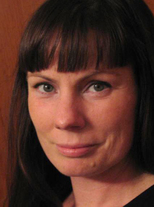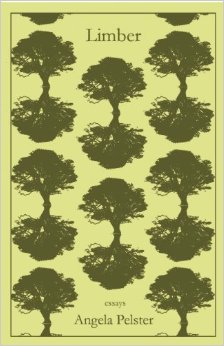Matthew Thorburn, Poet - Author of Dear Almost
Menu
 Recently I had the chance to interview Angela Pelster, author of the essay collection Limber (Sarabande Books, 2014), over at the Ploughshares blog. Limber is strange, surprising, unforgettable – one of those books I find I keep working into conversations and telling my friends they should read. You should too. Our conversation ranged well beyond the word limit for a Ploughshares interview—there’s just too much to ask a writer—so I’m pleased to share the rest of our interview here: As I said in our conversation on the Ploughshares blog, to me you write from the crossroads of essay, poem, memoir, fable, short story, meditation and prayer, bringing together elements of all those different kinds of writing to create something that is very original and compelling. How did you develop your approach to essay writing? I wrote a lot of poems and stories as a kid all throughout elementary school, until the desire to write creatively was squashed out of me from the writing we learned to do in class. It never occurred to me to take a creative writing course in college – I don’t think I even knew there was such a thing – but after I graduated with a Drama degree in Education, my life fell apart in a variety of awful and painful ways, and what had been a journaling practice became my coping mechanism. I found out that I liked writing and that I liked to think things through with my writing. I had just discovered Annie Dillard and Pilgrim at Tinker Creek blew my mind. I had no idea that people wrote like she did, and without meaning to, I started to imitate her in my own writing. I took a night course from the faculty of extension at the University of Alberta, and I wrote the first chapter of a children’s novel for a class assignment. The professor liked it, and since he had a publishing company, he offered to publish the book if I wrote the rest of it. It was a strange experience – personally, I was a disaster, but I had agreed to write this magical children’s book. So every day, I would wake up and cry for a while, and then journal, and then I would sit down and write for hours at a time. I’d leave behind all the real things that were going on, and drown myself in the adventures of a nine-year-old girl and her tiger on Salt Spring Island. I had no idea what I was doing, and I figured out how to write as I went along. What I really learned from that experience, though, was that I wanted to write. So I started taking more writing classes, I discovered the essay, and then I decided to get an MFA from Iowa in nonfiction writing. The first time I read a lyric essay I pretty much died of happiness. It was the kind of writing I had been doing all along, naturally, trying to blend fact and mythology and memoir and poetry without knowing that other people were doing the same thing. I found my writing home in the lyric essay and have been experimenting with it ever since.  I was struck by how your book opens with “Les Oiseaux” and closes with “Cardinal,” two brief, beautiful pieces that might easily fit into a collection of prose poems. Likewise, two of the most haunting pieces in the book—“Saskatoons,” a numbered sequence of scenes from a group home, and “Inosculation,” written in the voice of a man born in the 1880s—would be at home in a book of short stories. I’m curious if you ever write in these other genres. And more specifically, could you talk about your seemingly unusual (for essays) approach to narrative in “Saskatoons” and “Inosculation”? I don’t really think of myself as anything other than an essayist since the lyric essay lets me do whatever I want to do and not worry about how to categorize it. I know it’s not standard practice, and it makes it difficult to know where to put my book on the shelf, and my department doesn’t know what to call the classes I teach, but I actually like that. Life is so strange and unpredictable; it feels disingenuous to pretend everything can be divided up into such tidy genre categories. I’m interested in writing about the world and how to understand my place in it. I’m not out to trick anyone with what I write, but I also want to be free to use whatever writing tools I need in order to best think about the things I’m interested in. So sometimes I draw on facts, sometimes I turn to fiction, I try to always write with the attention of a poet, and often, all of these things will come together in a single essay. Those are my favorites. Both “Saskatoons” and “Inosculation” are factual stories written in fictional voices. I also created scenes in the essays that were based on fact but that I had very little information on and so mostly made them up. With both of these essays, I experimented with different kinds of voices until these ones appeared out of nowhere. Especially “Saskatoons.” It’s pretty vulgar to begin with, but also very truthful to the experience of life in a group home, and so as I wrote it I kept laughing, embarrassed about what I was writing, but knowing that to tame it would be to make it less true. When I showed a draft to my thesis advisor, he stopped halfway through the opening paragraph and nervously said, “What am I reading?” I told him to just keep going, and he did, and he agreed that it worked and was necessary. What are you working on now? What’s next for you? I recently moved to Baltimore while also discovering the twelfth-century mystic Hildegard of Bingen. So now I’m working on a manuscript that tries to discuss the violence, racism and poverty of Baltimore while thinking about Hildegard’s mysticism and how to respond to the city in a way that reflects my beliefs about equality and justice. It’s a lot to hold together at once, and I don’t really know where I’m going with it, but I guess that means I am at least doing it the way I should be. What have you read recently that moved you? Right now I’m reading Life on Mars by Tracy Smith and rereading The Meadow by James Galvin. I love both of these books for the same reason, which is their uncompromising compassion. There is such kindness in the writing, and the kindness never becomes sentimental or soft, but somehow maintains a brilliant sharpness. I have to put the books down sometimes and take a deep breath because they are so beautiful that it’s hard to bear it. Read “Saskatoons,” an essay from Angela Pelster’s Limber.
1 Comment
|
 RSS Feed
RSS Feed
